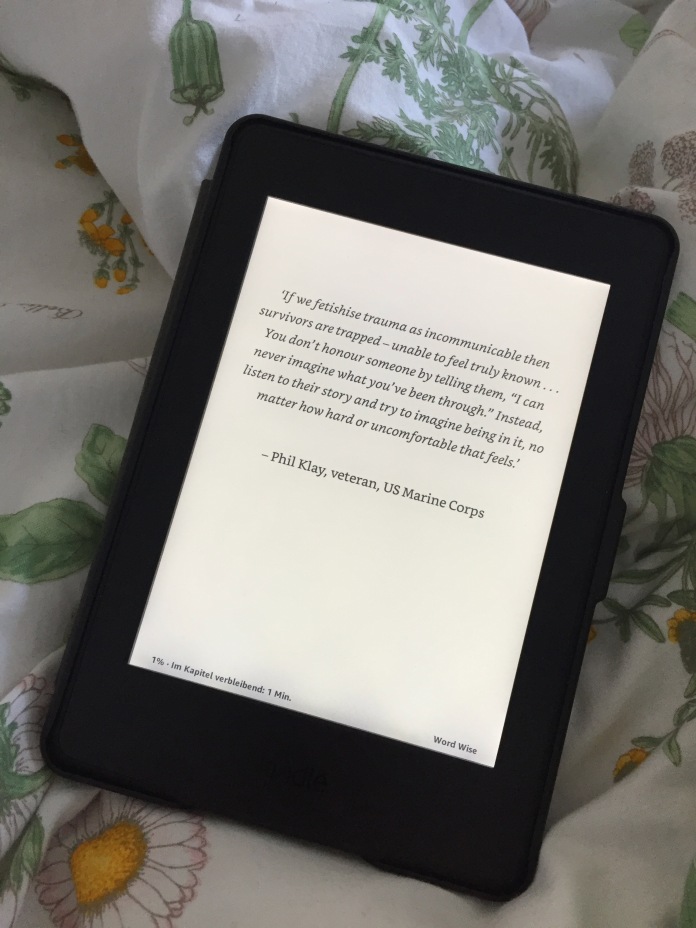
James Rhodes (2015), Instrumental, Canongate Books Ltd.
I met this particular book on a stride through the area around my rented practice room in Cologne. I had a break, a patient had not showed due to this mean flu that’s been going around. I hit one of my favorite book stores. As I walked in, I did what I always do – I looked around, almost forgetting why I had come here and guilt-tripping myself about spending more money on books when there were still too many waiting at home for me to read. ‘Der Klang der Wut’ – The sound of anger? The title sounding like some hippie therapeutic self-help manual, the cover looking like someone had been really eager to destroy shit – weird enough for me. I picked it up, and after a few seconds I knew it was exactly what I wanted to read. Now. Since I wanted to get the author’s original words I downloaded it on my kindle (ordering it would have taken a full day – please be understanding).
Instrumental – the title alone already deserves some form of an award. I could write about how James Rhodes managed to put unspeakable things into words that have healing potential to so many suffering from the ‘aftermath of violence’ as Judith Herman called whatever pile of symptoms survivors face. What truly wowed me is the ruthless honesty James Rhodes confronts us with. By us I mean the bystanders, the readers, the teachers, the psychologists and doctors, the friends, the family members, the partners. I have never read a book that used exactly the words I hear on a daily basis, that was able to capture the guilt, the shame, the horror (“clearly someone could only do those things to me if I were already inherently bad at a cellular level”) and the unbreakable will to ‘deal with this pile of shit’ as one of my patients put it. This book is loud. It is because it has to be. But just like the cited ‘Goldberg Variations’ this book alternates in volume and intensity and knows when it is best to refrain from using words but let silence speak for itself, creating images in our heads that might actually make us understand. And above all – music.
“It provides company when there is none, understanding where there is confusion, comfort where there is distress, and sheer, unpolluted energy where there is a hollow shell of brokenness and fatigue.”
Music is what structures the whole book. The chapters are all connected to a piece of classical music, the author giving an idea of why this particular piece was chosen and its context within the composer’s life. The book repeatedly invites us into this parallel universe that classical music seems like. And yet James Rhodes’ approach is that of a grassroots level folk musician. Neither stuck up nor brownnosed. It’s like a manifesto for the inherent value of creative work, “to find what you love and let it kill you” (as he quotes Bukowski). At the same time he harshly criticizes the industry behind (classical) music offering something the “few geriatric, inbred morons” neither show nor appreciate: truthful inspiration. An urge to be creative that needs expressing. He offers:
“My solution? Fuck the lot of them. Play what you want, where you want, how you want and to whom you want. Do it naked, do it wearing jeans, doing it while cross-dressing.”
Clear, authentic language and determination meets modest self-irony:
“OK, I know it sounds a little like some utopian vision of mine that occurred while taking a really long dump, but trust me, I will make this happen.”
He even gives helpful relationship advice (a circumstance he himself describes as “hysterical”):
“Stop being a dick. The biggest killer in any relationship is point-scoring. The great Persian poet, Rumi, wrote, ‘somewhere out there, beyond ideas of right and wrong, there is a garden. I’ll meet you there.’ ”
This is definitely the perspective of this book: subjective, neither claiming to be right, nor neutral, nor better.
I have already recommended this book to a number of friends, patients and colleagues, even before I finished it. I hope it will find many readers in Germany as its translation has been published recently. Things sometimes seem to have an ironic connection. I found the book when one of my patients (a survivor of sexual trauma) was down with the flu. I finished it today, sick in bed, drinking tea, listening to Ludovico Einaudi.
